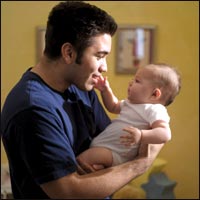21st century parents tops
Fathers who were spanked as children are less likely to spank their
own children than mothers who were spanked while young, according to a
US study.
Researchers from Ohio State University set out to see if 1990s
parents followed the practices of their own mothers but found parents
today were showing a lot more affection to their children, reading to
them more and spanking them less.
|

Fathers who were spanked as children are less
likely to spank their own children |
"We were surprised that mothers seem to learn a lot about the
parenting role from their own mothers, but fathers don't follow their
mothers as much," said researcher Jonathan Vespa in a statement.
The study of 1133 young adult parents, whose mothers took part in a
15-year study from 1979, found significant generational changes in
parenting practices.
Overall, there was a large generational shift in which the second
generation of parents was much less likely to spank than their own
parents.
Second generation mothers who were spanked at least once a week were
found to be nearly half as more likely to spank their own children
compared to mothers who weren't spanked.
Fathers spanked as children were less likely to spank their own
children. The study found only 28 per cent of the second generation of
fathers reported spanking their children compared to 43 per cent of
mothers.
"A little spanking of boys seems to deter (fathers) from spanking
their own children later in life," said Vespa.
"The evidence suggests that mothers are more the disciplinarians in
the family than fathers are today."
In general, the amount of affection that parents show their children
has increased significantly over the generations.
Sixty percent of fathers and 73 percent of mothers in the second
generation reported showing their children physical affection and
praising them within the last week compared to only 40 percent of their
parents openly showing affection weekly.
Reading to children had also increased markedly. Nearly three times
more mothers in the second generation reported reading to their children
daily compared to their own parents.
Sydney Morning Herald
|



